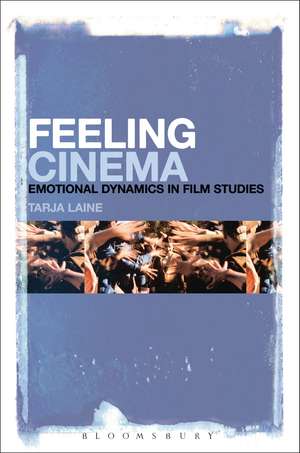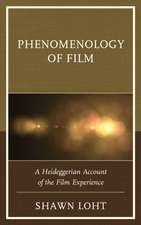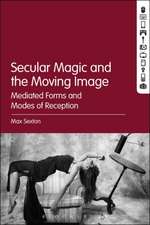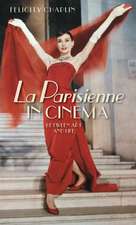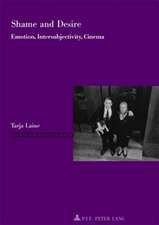Feeling Cinema: Emotional Dynamics in Film Studies
Autor Tarja Laineen Limba Engleză Paperback – 19 iun 2013
| Toate formatele și edițiile | Preț | Express |
|---|---|---|
| Paperback (1) | 191.38 lei 6-8 săpt. | |
| Bloomsbury Publishing – 19 iun 2013 | 191.38 lei 6-8 săpt. | |
| Hardback (1) | 771.75 lei 6-8 săpt. | |
| Bloomsbury Publishing – 30 noi 2011 | 771.75 lei 6-8 săpt. |
Preț: 191.38 lei
Preț vechi: 222.08 lei
-14% Nou
Puncte Express: 287
Preț estimativ în valută:
36.62€ • 38.34$ • 30.30£
36.62€ • 38.34$ • 30.30£
Carte tipărită la comandă
Livrare economică 05-19 aprilie
Preluare comenzi: 021 569.72.76
Specificații
ISBN-13: 9781623561505
ISBN-10: 1623561507
Pagini: 192
Ilustrații: 10
Dimensiuni: 152 x 229 x 18 mm
Greutate: 0.34 kg
Editura: Bloomsbury Publishing
Colecția Bloomsbury Academic
Locul publicării:New York, United States
ISBN-10: 1623561507
Pagini: 192
Ilustrații: 10
Dimensiuni: 152 x 229 x 18 mm
Greutate: 0.34 kg
Editura: Bloomsbury Publishing
Colecția Bloomsbury Academic
Locul publicării:New York, United States
Caracteristici
Proposes new theories of film emotion that move beyond character engagement studies
Notă biografică
Tarja Laine is Assistant Professor of Film Studies at the University of Amsterdam in the Netherlands. She is the author of Shame and Desire: Emotion, Intersubjectivity, Cinema (2007).
Cuprins
Acknowledgments Introduction Chapter 1: Horror Overwhelming fear: The Shining Imprisoned in madness: Repulsion Chapter 2: Hope Morbid curiosity: The Vanishing Clairvoyant spectatorship: Don't Look Now Chapter 3: Trauma Death as entelechy: The Sea Inside Psychosis as refuge: Elementary Particles Psychosis as entrapment: Reprise Compassionate participation Chapter 4: Anguish Becoming rhythm Synaesthetic tactics: Dancer in the Dark Resonating sonic space: The Silence Chapter 5: Shame Suburban rebellion: American Beauty Unruly sociology: Borat Chapter 6: Anger Looking down with contempt: Elephant Hate as positive liberty: Hunger Friendship as resentment in solidarity: 4 Months, 3 Weeks & 2 Days Chapter 7: Love Cinema as seduction: Dangerous Liaisons Ironic abjection: Romance Authentic love: Eternal Sunshine of the Spotless Mind Bibliography Index
Recenzii
Laine's book remains strong and contains many valuable additions to the growing body of scholarly work on cinema and emotions. The book serves both as a good introduction to the debates regarding emotions and affects in cinema, while also pushing the field further, particularly in its synthesis of two often competing traditions.
Tarja Laine's Feeling Cinema is a remarkably eloquent and accomplished contribution to the growing wave of theoretical work on our affective and emotional engagement with film. Not only does Laine develop excellent analyses of the copious theoretical literature on cinematic emotion, she offers a powerful and persuasive way of conceptualising our aesthetic experience of film as an 'emotional event'. Her perspicuous theoretical discussions of key emotions are elaborated via nuanced critical reflections on the 'emotional core' of selected films spanning horror, thriller, art house, and romance genres. Feeling Cinema is thus enlightening and engaging reading for anyone-student, theorist, or cinephile-wanting to understand the emotional power of movies. --Robert Sinnerbrink, Senior Lecturer in Philosophy, Macquarie University, Sydney
Tarja Laine's Feeling Cinema is a remarkably eloquent and accomplished contribution to the growing wave of theoretical work on our affective and emotional engagement with film. Not only does Laine develop excellent analyses of the copious theoretical literature on cinematic emotion, she offers a powerful and persuasive way of conceptualising our aesthetic experience of film as an 'emotional event'. Her perspicuous theoretical discussions of key emotions are elaborated via nuanced critical reflections on the 'emotional core' of selected films spanning horror, thriller, art house, and romance genres. Feeling Cinema is thus enlightening and engaging reading for anyone-student, theorist, or cinephile-wanting to understand the emotional power of movies. --Robert Sinnerbrink, Senior Lecturer in Philosophy, Macquarie University, Sydney
